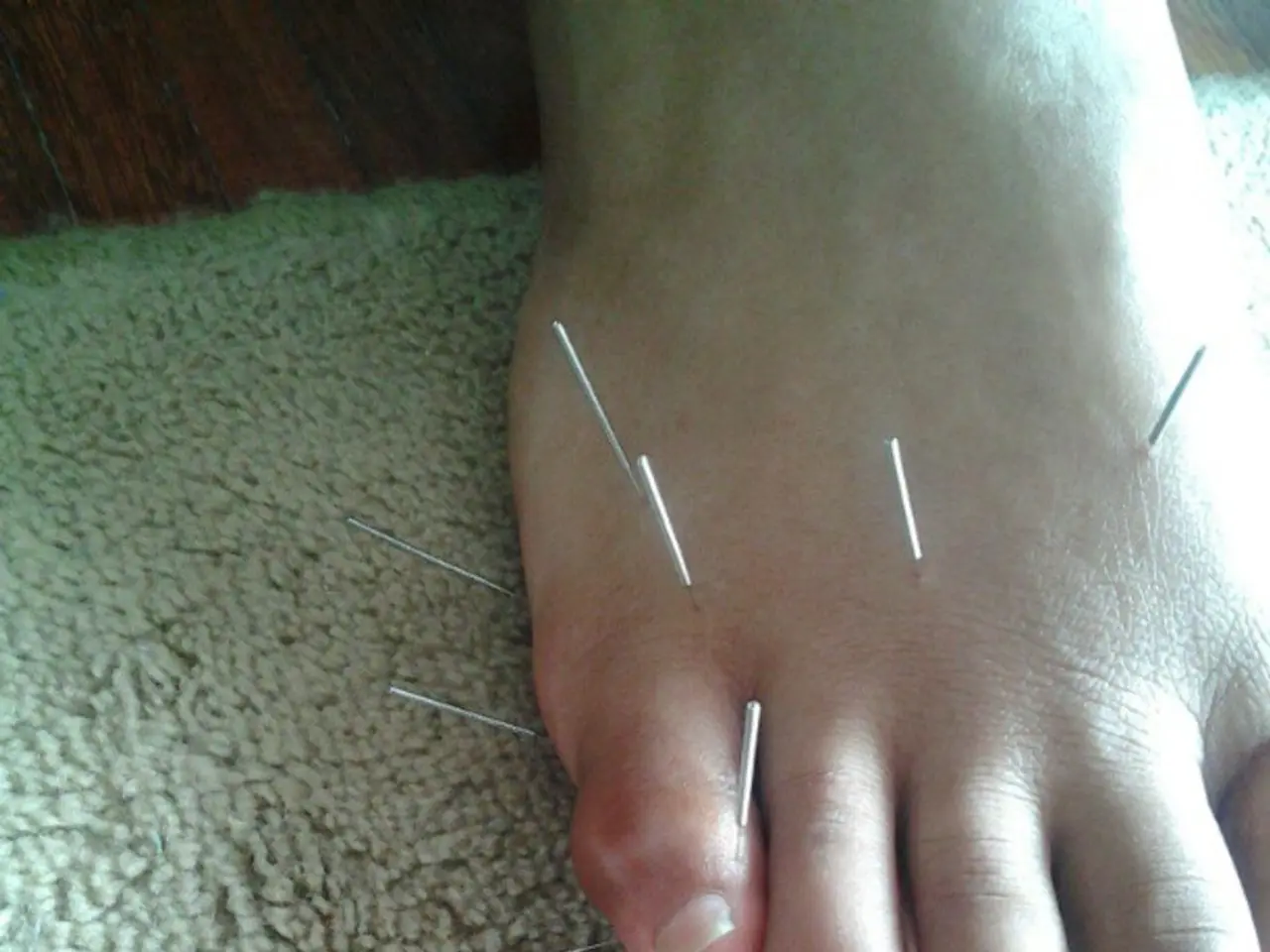Diseases of Connective Tissue: Types, Symptoms, and Further Information
Connective tissue diseases are a diverse group of disorders that affect the function and structure of connective tissue. These diseases can be inherited or autoimmune in nature, each with their unique set of symptoms and management strategies.
Common Symptoms Across Both Types
Many connective tissue diseases share common symptoms, such as joint pain, swelling, and weakness (arthritis, muscle weakness), skin manifestations like rashes, tight or dry skin, pigmentation changes, ulcers, telangiectasias (dilated blood vessels), calcinosis (calcium deposits), and skin fibrosis. Raynaud's phenomenon, a condition where fingers and toes change color due to vasospasm after cold or stress, is common in autoimmune types like systemic scleroderma and mixed connective tissue disease. Fatigue is widespread in autoimmune connective tissue diseases, contributing to a general sense of illness. Internal organ involvement is also common, causing abnormalities or dysfunctions in organs such as the lungs, heart, kidneys, and the esophagus.
Symptoms More Common in Inherited Connective Tissue Diseases
Inherited connective tissue diseases, such as Ehlers-Danlos syndrome, often present with additional symptoms like hypermobile joints and joint pain, looseness or hyperextensibility of joints with a risk of dislocations. The skin may have an abnormal texture, being stretchy, velvety, and prone to abnormal scarring. Other symptoms may include gastrointestinal issues (reflux, poor motility), nerve disorders, bleeding tendencies (platelet dysfunction), and pregnancy complications. Neurological and developmental associations, such as increased frequency of ADHD, autism spectrum, mood and anxiety disorders, are also reported in some inherited connective tissue disorders.
Autoimmune Connective Tissue Diseases Symptoms Summary
Autoimmune connective tissue diseases like rheumatoid arthritis (RA) present with symptoms like Raynaud's phenomenon, skin rashes, fibrosis, ulcers, telangiectasia, calcinosis, arthritis and muscle weakness, internal organ involvement (heart, lungs, kidneys, esophagus), fatigue, and systemic symptoms.
Inherited Connective Tissue Diseases Symptoms Summary
Inherited connective tissue diseases like Ehlers-Danlos syndrome present with symptoms like joint hypermobility and frequent joint pain, soft, stretchy skin with abnormal scarring, neurological symptoms and autonomic dysfunction, gastrointestinal and bleeding complications, and associated neurodevelopmental or psychiatric issues.
Management and Treatment
There is no cure for connective tissue disease, but treatments can help people manage symptoms, prevent complications, and improve quality of life. Treatment for RA may involve a combination of medications and lifestyle strategies. People living with connective tissue disease can take proactive steps to look after their health, such as scheduling regular checkups with a doctor, going to screenings to monitor for signs of complications, setting up deliveries for prescription medications, eating a healthy, balanced diet, maintaining a moderate weight, getting regular exercise, making time for relaxation, avoiding or quitting smoking, protecting their hands and feet from the cold, and avoiding certain activities to prevent damage to fragile skin or hypermobile joints.
Risk Factors
Other risk factors for autoimmune connective tissue disease include female sex, cigarette smoking, other preexisting autoimmune disorders, exposure to certain chemicals, certain medications, and obesity.
Understanding the symptoms and management strategies of connective tissue diseases is crucial for early diagnosis, effective treatment, and improved quality of life for those affected. If you or someone you know is experiencing symptoms, it is essential to seek medical advice promptly.
- Rheumatoid arthritis (RA), an autoimmune connective tissue disease, can cause symptoms like Raynaud's phenomenon, skin rashes, fibrosis, ulcers, telangiectasia, calcinosis, arthritis, and muscle weakness.
- Inherited connective tissue diseases, such as Ehlers-Danlos syndrome, often present with additional symptoms like joint hypermobility, soft, stretchy skin with abnormal scarring, neurological and autonomic dysfunction, gastrointestinal and bleeding complications, and associated neurodevelopmental or psychiatric issues.
- Many connective tissue diseases share common symptoms, such as joint pain, swelling, and weakness, skin manifestations like rashes, tight or dry skin, pigmentation changes, ulcers, telangiectasias, calcinosis, and skin fibrosis.
- Treatment for rheumatoid arthritis may involve a combination of medications and lifestyle strategies like eating a healthy, balanced diet, maintaining a moderate weight, getting regular exercise, making time for relaxation, avoiding or quitting smoking, protecting hands and feet from the cold, and avoiding certain activities to prevent damage to fragile skin or hypermobile joints.
- Fatigue is widespread in autoimmune connective tissue diseases, contributing to a general sense of illness, and internal organ involvement is also common, causing abnormalities or dysfunctions in organs such as the lungs, heart, kidneys, and the esophagus.
- Understanding the symptoms and management strategies of connective tissue diseases is crucial for early diagnosis, effective treatment, and improved quality of life for those affected.
- Other musculoskeletal disorders, dermatology conditions, chronic diseases, mental health issues, and even skin care or nutrition might be related to or affected by connective tissue diseases, making it essential to seek medical advice promptly if symptoms arise.
- The risk factors for autoimmune connective tissue disease include female sex, cigarette smoking, other preexisting autoimmune disorders, exposure to certain chemicals, certain medications, and obesity.




